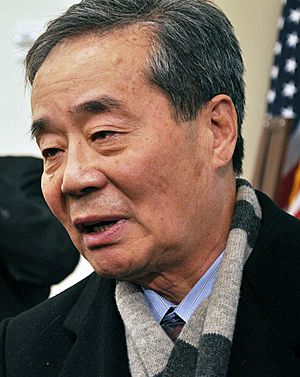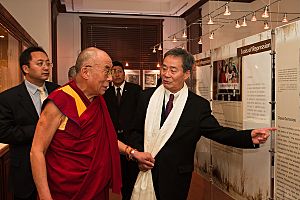Harry Wu facts for kids
Quick facts for kids
Harry Wu
|
|||||||
|---|---|---|---|---|---|---|---|
| 吴弘达 | |||||||

Wu during a press conference at Washington D.C. in January 2011
|
|||||||
| Born | February 8, 1936 |
||||||
| Died | April 26, 2016 (aged 79) |
||||||
| Citizenship | United States | ||||||
| Spouse(s) | Ching Lee | ||||||
| Children | Harrison Wu | ||||||
| Chinese name | |||||||
| Traditional Chinese | 吳弘達 | ||||||
| Simplified Chinese | 吴弘达 | ||||||
|
|||||||
Harry Wu (Chinese: 吴弘达; pinyin: Wú Hóngdá; February 8, 1937 – April 26, 2016) was a Chinese-American human rights activist. He worked to expose and end human rights abuses in China. Wu spent 19 years in Chinese labor camps, which are like prisons where people are forced to work. After his release, he moved to the United States and became a citizen. In 1992, he started the Laogai Research Foundation to teach the world about these camps.
Contents
Biography
Early life and education
Harry Wu was born in Shanghai, China, into a wealthy family. His father worked in banking, and his mother came from a family of landowners.
Wu studied at the Geology Institute in Beijing. He earned a degree there. In 1956, the Communist Party started a program called the Hundred Flowers Campaign. They asked people, especially students, to share their honest thoughts about the government.
Even though he was careful, Wu spoke up. He disagreed with the Soviet Union's military actions in Hungary. He also didn't like how people were put into different groups by the government.
Later in 1956, China's leader, Mao Zedong, changed his mind. He said that the true enemies of the Party had shown themselves. Harry Wu, who was 19, was then singled out at his university. He later wrote that this was the first time he was seen as a "political troublemaker."
For the next few years, Wu was often criticized in Party meetings. He was watched closely until he was arrested in 1960 at age 23. He was accused of being a "counterrevolutionary rightist." This meant he was against the government. He was then sent to the laogai, which is China's system of forced-labor prison camps.
Life in the labor camps
Harry Wu was held for 19 years in 12 different labor camps. He was forced to do hard work like mining coal, building roads, clearing land, and planting crops.
In the camps, Wu met a tough, uneducated farmer nicknamed "Big Mouth Xing." Wu wrote that Xing's mouth seemed to stretch "all the way to his ears." Xing had often been hungry, both in his village and in the camps. He became obsessed with finding enough food.
Xing was lean and strong, with missing teeth. He taught Wu how to survive in the camps. He showed Wu how to dig for rat burrows underground to find hidden grain and beans. These could be boiled for food to avoid starvation. Xing also taught Wu how to be strong and stand up to bullies.
Wu came from a city and had an education, so he was new to this kind of harsh life. Xing often told him, "Nobody here will take care of you. You have to take care of yourself."
Wu was released from his life sentence in 1979 when he was 42 years old. This happened because of political changes after the death of Mao Zedong. He got a teaching job at the Geoscience University in Beijing. However, being a political prisoner still affected him.
Wu also noticed that people who had labeled him "an enemy of the people" years earlier reacted strangely to his return. They often said, "All that has happened is in the past... the Party has suffered too."
Wu left China for the United States in 1985. He received an invitation from the University of California at Berkeley to be a visiting scholar. A professor at Berkeley had read an article Wu wrote about geology.
Starting a new life in the U.S.
Wu arrived in the U.S. with only 40 dollars, a few clothes, and an ink painting from his father. He didn't have money from the university for his first year, so he had to find ways to survive. At first, he slept in parks and on the Bay Area Rapid Transit train when it rained.
He worked a night job making donuts for a few months. Then he worked at a liquor store. Finally, he was able to rent a cheap apartment. Wu continued to do various odd jobs. In 1988, he started working for a company that made electronic chips. He became an assistant manager there and could buy a used car. Looking back, Wu felt that America offered opportunities if he worked hard.
During his first years in America, Wu did not want to think or talk about politics. He felt he had lost his youth and wanted to enjoy his freedom. But slowly, he was drawn back into discussions about China's prison camps and his own experiences.
In 1986, Wu was asked to speak about his time in the camps to college students at the University of California, Santa Cruz. As he spoke, he started to cry. He felt he was speaking for the many forgotten prisoners who had died.
Focus on the laogai system
In 1988, Wu met with a curator at the Hoover Institution at Stanford. He explained his interest in studying China's forced-labor prison camps. Wu was a geologist, not a social studies expert. But his stories about the camps interested the curator, who invited him to do research as a visiting scholar.
From then on, Wu began to collect information about China's labor prison camp system. In China, this system is called laogai, which means "reform through labor." Wu eventually published a book called Laogai: The Chinese Gulag in 1992.
In the early 1990s, Wu made several secret trips into China. He wanted to gather proof of these labor camps for the outside world. This involved visiting different camps and secretly taking photos and videos.
In 1990, Senators Alan Cranston and Jesse Helms invited Wu to speak to the Senate about laogai. In 1991, Wu worked with Ed Bradley for a TV show called 60 Minutes. They pretended to be businessmen interested in buying goods made by prisoners in China.
In 1992, Wu started the Laogai Research Foundation. This is a non-profit group that does research and educates the public. It became a main source of information about China's labor camps. Wu also helped show that organs from executed prisoners were being used for organ transplants. The foundation also works to share information about other human rights issues in China.
In 1995, Harry Wu, who was then a U.S. citizen, was arrested when he tried to enter China with false documents. The Chinese government held him for 66 days. He was found guilty of "stealing state secrets." He was sentenced to 15 years in prison, but was immediately deported from China instead. He believed his release was due to an international effort to help him.
In November 2008, Wu opened the Laogai Museum in Washington, D.C. He called it the first museum in the United States to focus directly on human rights in China.
Recognition
Harry Wu received many awards for his human rights work. In 1991, he received the Freedom Award from the Hungarian Freedom Fighters' Federation. In 1994, he was given the first Martin Ennals Award for Human Rights Defenders.
He received the Courage of Conscience Award in 1995 for his great efforts to show human rights violations in China. In 2012, he received an honorary doctorate from the Institute of World Politics in Washington, DC.
In 1996, he was awarded the Geuzenpenning, a Medal of Freedom from the Dutch World War II Resistance Foundation. He also received honorary degrees from Saint Louis University and the American University of Paris. That same year, the Columbia Human Rights Law Review gave Wu its second Award for Leadership in Human Rights. In 1997, Wu received the Walter Judd Freedom Award for speaking out against unfair governments.
Wu served as the Executive Director of the Laogai Research Foundation and the China Information Center. He was also a member of the International Council of the New York-based Human Rights Foundation. He was a member of the international advisory council of the Victims of Communism Memorial Foundation.
Death
Harry Wu died in Honduras on April 26, 2016. He was 79 years old and was on vacation with friends. He was survived by his former wife, Ching Lee, and their son, Harrison.
Books
- Laogai: The Chinese Gulag (1992), the first full story of the Chinese labor camp system.
- Bitter Winds (1994), a book about his time in the camps.
- Troublemaker (1996), a story about Wu's secret trips to China and his arrest in 1995.
- Thunderstorm in the Night (2003), Wu's first Chinese language book; his life story.
- New Ghosts, Old Ghosts, Prisons and Labor Reform Camps in China (1999), by James Seymour and Richard Anderson.
- Nine Lives: Making the Impossible Possible (2009), edited by Peter Braaksma, which tells the stories of Wu and 8 others who made the world better.
- The Sunflower (1998), by Simon Wiesenthal, edited by Hary James Cargas and Bonny V. Fetterman.
See also
 In Spanish: Harry Wu para niños
In Spanish: Harry Wu para niños
- Chinese dissidents
- Censorship in China
 | Misty Copeland |
 | Raven Wilkinson |
 | Debra Austin |
 | Aesha Ash |


